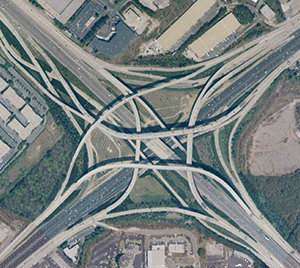Staff Reporter
Georgia DOT to Expand Connected Vehicle Technology in Atlanta

[Stay on top of transportation news: Get TTNews in your inbox.]
The Georgia Department of Transportation plans to hear from the private sector about ways to use connected vehicle technology on roadways in the Atlanta metropolitan area.
Connected vehicle technology, which allows a vehicle to communicate with other vehicles or components of infrastructure, has the potential to improve safety, reduce travel times and enhance traffic management.
According to a notice published Feb. 6, GDOT announced the “imminent release” of a request for proposals from private sector groups.
GDOT’s notice arrived about two weeks after Gov. Brian Kemp announced a Regional Connected Vehicle partnership between GDOT and the Atlanta Regional Commission that is projected to implement the technology in 1,000 additional locations. So far, more than 400 locations across metropolitan Atlanta are equipped with connected vehicle technology.
In part two of a two-part exploration of autonomous technology today, our latest RoadSigns podcast revisits conversations with Chuck Price of TuSimple and Ognen Stojanovski of Pronto.ai. Hear them discuss a palatable Level 2 version of trucking autonomy. Listen to a snippet above, and to hear the full episode, go to RoadSigns.TTNews.com.
“Georgia DOT is leveraging innovative strategies to enhance transportation that help improve the quality of life of hardworking Georgians in all parts of our state,” Kemp said. “We work hard to continue to bring private and public sectors together to build relationships. Working with regional partners ensures the seamless deployment of this technology at the local level.”
Some $10 million — $8 million in federal funds and $2 million in matching funds from local governments and community improvement districts — will be dedicated to the partnership’s work. A community improvement district is a government office that provides services such as infrastructure planning. The funding will support the implementation of connected vehicle technology needed for applications such as transit signal priority and emergency vehicle pre-emption, which allows emergency vehicles to move through intersections quicker and safer.
The new locations will involve Dedicated Short-Range Communications and vehicle-to-everything (V2X) technology. According to GDOT, the existing 400 locations use only DSRC.

Spaghetti Junction via NASA World Wind
“The regional connected vehicle program will help boost safety and mobility across metro Atlanta,” said Atlanta Regional Commission Chairman Kerry Armstrong. “It’s especially encouraging to see this program develop as a truly collaborative effort involving not just ARC and GDOT, but also local governments and [community improvement districts].”
Atlanta’s population and transportation needs are growing. ARC projects that the metro region will add more than 2.5 million people and 1 million jobs by 2040.
Atlanta also is home to some of the most congested bottlenecks in the country. Its five-level stack interchange where interstates 285 and 85 North intersect, known as “Spaghetti Junction,” ranked No. 2 on the American Transportation Research Institute’s truck bottlenecks report, released Feb. 12. (This intersection ranked No. 1 on last year’s report.)
The third spot on ATRI’s list, the intersection between I-75 and I-285 North, also belongs to Atlanta.
Want more news? Listen to today's daily briefing:





